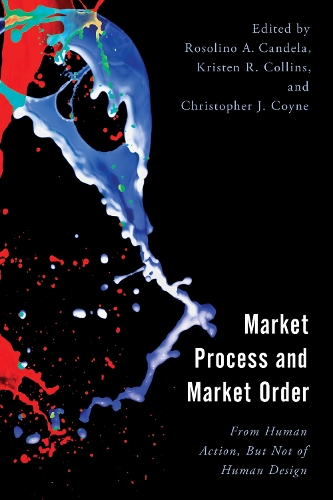
Market Process and Market Order: From Human Action, But Not of Human Design
(Hardback)
Publishing Details
Market Process and Market Order: From Human Action, But Not of Human Design
By (Author) Rosolino A. Candela
Contributions by Rosolino A. Candela
Contributions by Jeffrey Carroll
Edited by Kristen R. Collins
Contributions by Kristen R. Collins
Edited by Christopher J. Coyne
Contributions by Christopher J. Coyne
Contributions by Jonathan Eaton
Contributions by Craig Lyons
Contributions by Brian Marein
Bloomsbury Publishing PLC
Lexington Books/Fortress Academic
23rd September 2022
United States
Classifications
Professional and Scholarly
Non Fiction
Behavioural economics
Society and culture: general
330.157
Physical Properties
Hardback
300
Width 159mm, Height 237mm, Spine 29mm
635g
Description
This volume explores and engages the key thinkers and ideas of the Austrian School of political economy to better understand various aspects of the market process, or the way that individuals coordinate their separate interests in a peaceful and productive manner by unintentionally forming not only market prices but also rules, customs, cultural norms and other institutional arrangements that allow specialization and trade. Together, these dynamics generate a market order by ameliorating the potential for social conflict, and in turn, facilitating the conditions for social cooperation and specialization under the division of labor. Scholars in this tradition focus on how individuals, however imperfect they may be in their decision-making, are nevertheless guided by private property, prices, and profit and loss signals, which emerge out of human action, but not necessarily human design. The diversity in topics and approaches will make the volume of interest to readers in a variety of fields, including anthropology, economics, entrepreneurship, history, philosophy, political science, and public policy.
Reviews
This new collection illustrates the continued relevance and promise of Austrian market process thinking for understanding the social world.
This volume expands our understanding of the relevance of the market process and market order in the Austrian tradition for political economy today. By applying insights about imperfect human beings who still can form helpful institutions through collective actions rather than one intelligent designer to many aspects of political life, the volume demonstrates the wide applicability of the Austrian tradition of political economy across several policy issues from federalism to Chinese entrepreneurship to education reform.
Author Bio
Rosolino Candela is senior fellow at the F. A. Hayek Program for Advanced Study in Philosophy, Politics, and Economics at the Mercatus Center at George Mason University.
Kristen R. Collins is senior fellow at the F. A. Hayek Program for Advanced Study in Philosophy, Politics, and Economics at the Mercatus Center at George Mason University.
Christopher J. Coyne is professor of economics at George Mason University and associate director at the F. A. Hayek Program for Advanced Study in Philosophy, Politics, and Economics at the Mercatus Center at George Mason University.
